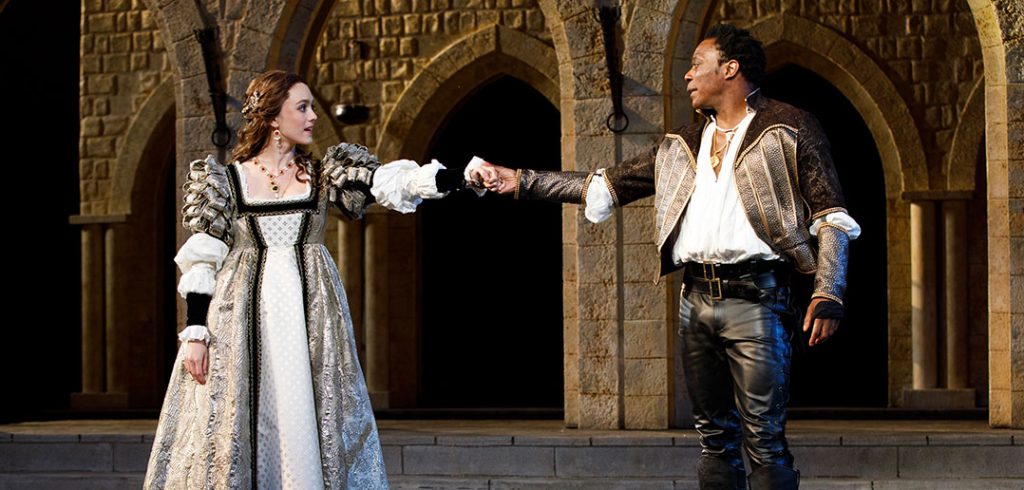For Lind, a 2005 Fordham Theatre grad, the Shakespearean role is somewhat of a homecoming. One of her first plays was a middle-school production of Twelfth Night in which she and her twin sister, Christina Bennett Lind, FCLC ’05, played twins Sebastian and Viola. And in 2010, she appeared in both of the Public Theater’s Shakespeare in the Park productions—as Perdita in The Winter’s Tale and as Jessica, daughter to Al Pacino’s Shylock, in The Merchant of Venice. But while those two characters were wide-eyed ingénues, Lind’s Desdemona is more complex.
“What’s been really interesting doing this production is that Desdemona is often thought of as naive, that she’s blind to the dangers she’s entering upon, and she’s so pure that the accusation of infidelity shatters her,” Lind says. “I think on closer look [at the text], she makes a lot of choices that aren’t innocent, with full knowledge of the risks she’s taking. She disappoints and breaks her father’s heart. She lies sometimes to Othello [about losing the handkerchief, for example]. She’s not a saint. She’s bold. And she really has a lot of opportunities to be surprising.”
Lind’s interpretation has pleased reviewers—The New York Times said it “was a pleasure to see a Desdemona so full of verve and increasing, chin-raising indignation. Ms. Lind has given us an unblushing bride who appreciates her own worth,” while assuring audiences that her “love for Othello is never in doubt.”
It has also resonated with theatergoers, including Rachael Hilliard, GSAS ’18, who recently earned a Ph.D. in English at Fordham, completing her dissertation on the intersection of Shakespeare, new media, and performance. “Desdemona can so easily fade into the background,” Hilliard says, “a Venetian ornament to adorn her father’s house, then Othello’s. Lind’s Desdemona, though, is feisty and even playful with Othello. Even in her (spoiler alert) death scene, she fights tooth and nail for another breath: This is no dying swan scene.”
Despite the inevitable ending, Lind’s portrayal is the perfect Desdemona for the current moment, when a greater awareness for women’s diverse voices and experiences has entered the mainstream—including through the #MeToo movement, which Lind has supported. “I often think of women as having muzzles on, the kind they give to really violent dogs,” Lind says. “What’s been a great change to watch is seeing women taking the muzzles off a little. I think that’s the biggest change we could have made as women. So many things have been taken away from us out of the fear to speak out, or the fear of being punished, which has happened in so many cases.
“I’ve noticed that there’s a little bit more respect for what experience a particular woman is having now,” Lind says. “I feel proud to be a part of a lot of conversations that were being had. It’s taught me a lot about really listening more closely to people who have no power.”
It’s something Lind has been doing for a long time through her acting, and what drew her to the profession in the first place—communicating different human experiences. It’s also why she found her philosophy minor at Fordham so helpful. “I don’t think I knew the value of it until I graduated, but it is so informative for my acting and my artistic perspective, for figuring out the basics of making ideas articulable,” Lind explains. “It gave me a real respect for asking the right questions.”
Those questions are particularly important when Lind is acting in a period piece, as she did recently for her starring role in TV’s Turn: Washington’s Spies and in her work in Shakespeare in the Park. It’s something that allows her to see the tragedy of Othello in a more complex way.
“It can be frustrating as a modern woman to feel the injustices of the social restrictions of the time period so deeply,” Lind says. “But Desdemona gets to express how unjust the world can be to her, and to Othello as well. I think the tragedy of the play is that we get to see the potential of what that couple could have been. I think they’re equals in a big way, and it’s such a tragedy to see that fall apart.”
Lind was grateful for the opportunity to take on such a complex role, and to return to the Delacorte, the outdoor theater that’s home to the Public’s Shakespeare in the Park.
“It’s challenging in lots of ways—there are airplanes and raccoons and stuff that you don’t have to deal with at normal theaters,” she says. “But it’s magical. There’s a real supernatural quality about the park. It’s fun and unexpected. And it’s one of the best experiences that I think you can have as an actor in New York—it’s a real thrill to work there.”
Othello ends its run on June 24. This season of Shakespeare in the Park continues with Twelfth Night, running from July 17 through August 19.

